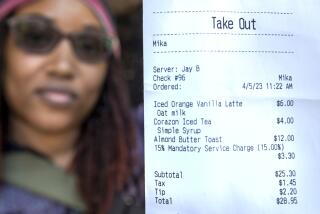A Tale of Ethics: the Positive and Negative
Todayâs morality tale arrives compliments of Mr. Thomas Conley of Fullerton, who neatly divides his story into two parts. He refers to them as the positive part and the negative part. The tale is set in a glamorous San Francisco hotel and involves Middle Eastern royalty and a room service employee who delivered champagne to their suite.
Ultimately, though, the story is about you and me.
As related in a letter by Mr. Conley and corroborated by a hotel employee who didnât want to name names, some weeks ago a royal family checked into the hotel and ordered an $80 bottle of champagne. A family member unfamiliar with U.S. currency gave the room service employee $800 in cash. The hotel source says the employee could have pocketed the money with no one the wiser.
Instead, the employee tried to give the money back. Embarrassed and confused by the hassle, the royal family member ordered the employee from the room. Instead of throwing up his hands and keeping the extra $720, the employee went to his supervisor and, with the concierge in tow, returned to the room and corrected the overpayment.
Mr. Conley writes: âI was fascinated by the story. Thatâs the positive part.â
Ah, but he continues: âNow comes the negative part. When I proudly told my friends about this, I was the one who was stunned. Many of them told me they thought the server should have boogied with the money and flipped off the âtowel heads.â What am I missing here? Have we become somehow a nation of greedy little people who feel justified in disregarding the basic rights of our fellow man simply because he can afford it? Iâve argued this point many times over during the past few weeks and generally have to mimic a short course in ethics before people will grudgingly admit that the sheik deserved better.â
Have we become a nation of greedy little people?
Uh, well. Gee.
Ill-equipped to answer Mr. Conleyâs question, I luckily got a letter that same week from Richard Doetkott, a communications professor at Chapman University in Orange. For the spring semester, heâs teaching a class entitled, âIntegrity: What It Is, Who Has It, How Itâs Kept, How Itâs Lost.â
In outlining the course, Doetkott wrote: âThe world is getting grayer and grayer for people who wish to keep their integrity. We must try to define ourselves and what we believe and the way we must live. Not just with others, but with ourselves.â
Doetkott sees a slow invasion against ethics in the workplace that results âin the fraying away at the edges of a personâs integrity. I donât think you suddenly lose your integrity. I think itâs a slow erosion. Pretty soon you find yourself on the other side of the line and you didnât realize when you crossed over.â
To many people, Doetkott says, the employeeâs action seems obvious. On the other hand, he could have immersed himself in rationalizations. âHe could have said, âThey donât pay enough on this job, the guy [who overpaid] is a fool, he has too much money anyway, he wouldnât miss it.â But to a person of integrity, none of that would make any difference.â
Few professions are exempt from the erosion of integrity, Doetkott says. âI think the most dangerous is the professional--whether itâs a doctor, lawyer, journalist or college professor--who has compromised little by little by little until, when a major question arises, they donât have a moral compass anymore. It points in every direction.â
Doetkott, 60, insists he isnât wearing rose-colored glasses about the past. âI donât think everything was wonderful when I was growing up in the â50s, but I think there was a certain standard that people tried to meet, a certain standard that was accepted.â
He blames what he calls âgroup-thinkâ for allowing standards to wane. Rather than adhering to what we know is right and wrong and shunning violators, professionals have let ethics become situational and ever-evolving.
Conley says he was shocked at the lack of moral certainty over the hotel scenario. I canât say Iâm pleased by his friendsâ reactions; nor am I shocked.
Nor do I know why people stray from the ethical fold. We just do. For today, Iâm content to raise a toast to the anonymous employee who delivered the champagne but wouldnât boogie with the cash. Letâs thank him for holding up his little corner of a world that seems to grow ever more wobbly.
Dana Parsons writes a column three times a week for the Orange County edition.
More to Read
Sign up for Essential California
The most important California stories and recommendations in your inbox every morning.
You may occasionally receive promotional content from the Los Angeles Times.










